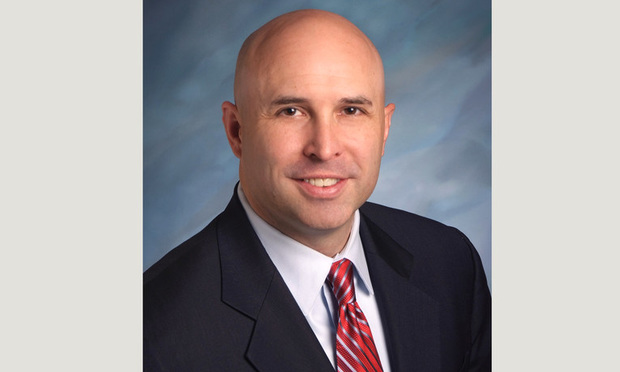How In-House Counsel Are Trying to Keep Pace With Managing Constant Change
Executive Institute hosts roundtables usually including general and senior in-house counsel, a few participants from outside law firms, plus experts on behavioral and data science to discuss issues such as diversity and inclusion, technology, sustainability and leadership.
October 07, 2019 at 05:43 PM
4 minute read
 Robert Taylor, vice president and senior corporate counsel with Liberty Mutual Insurance/courtesy photo
Robert Taylor, vice president and senior corporate counsel with Liberty Mutual Insurance/courtesy photo
Senior corporate counsel Robert Taylor of Liberty Mutual Insurance likes to start with the mantra: "It's called transformation if you are paying attention, and disruption if you're not."
Taylor, who leads Liberty Mutual's legal ideation and transformation team in Boston, pays lots of attention to change in the legal space and how to adapt to it. He recently took part in a roundtable discussion with other in-house leaders as part of the Executive Institute.
"For me, it is a rather unique experience," Taylor explained to Corporate Counsel, "with a very curated group of professionals that come together with the sole intention of wanting to have mature in-depth discussions to examine and define and promote leadership around a particular issue, such as diversity and inclusion, technology/process/people, sustainability and leadership."
They are all top-of-the-mind topics for legal departments, he said, "but rarely do we get an opportunity to have in-depth discussions about them. If I have a concept I want to get at, one good way to harden my theory is to go to one of these roundtables and put my idea out there and let people react. And if I get a massively negative reaction, that's valuable for me to know."
It's not panels or talking heads, Taylor added, but intimate exchanges of ideas and perspectives among 35 to 40 peers. The Executive Institute roundtables are facilitated by attorney David Curran, chief business officer of New York-based FiscalNote, the parent company of the institute.
"Curran is a master facilitator," Taylor said. "He's not dominating the conversation, but facilitates the extraction of the collective brilliance in the room."
Curran brings his past legal experience to the sessions. He worked 15 years as in-house counsel and a chief compliance officer at Thomson Reuters, Reader's Digest Association Inc., Campbell Soup Co. and other companies.
He said the roundtables are built around a few key themes, such as change management. "Lawyers are not trained in these things in law school," Curran noted. "Change management is core."
The roundtables usually include general and senior in-house counsel, a few participants from outside law firms, plus experts on behavioral and data science. Sometimes, especially when companies host a roundtable, he will include CEOs and chief operating officers in discussions with their own and outside lawyers about certain issues.
Several of the roundtables have dealt with #MeToo issues. "It's hard to get a handle on," Curran told Corporate Counsel. "I personally believe that lawyers made the Roger Ailes and Harvey Weinsteins possible, and were complicit in their behavior. They got their oxygen from lawyers, and were protected by lawyers and their confidential settlements."
Curran added, "I believe the profession needs to do a way better job of having a conscience and not letting those things happen. Outside counsel make a lot of money off these investigations, and I'm not sure lawyers are doing all they can proactively to solve the problem."
He said companies that have recently hosted sessions include Uber Technologies Inc., headed by its general counsel, Tony West; Microsoft Corp. in Brussels; and The Economist Newspaper Ltd. in London. Latham & Watkins and Viacom Inc. hosted a session about disruption on Oct. 2 in Menlo Park, California, and Paul Hastings is hosting a Nov. 12 roundtable in New York on big data and artificial intelligence in law.
"All the discussions have a couple common themes," he explained. "One is the collision of modern-day challenges, and the in-house and law firm structures that are not designed or prepared to deal with them."
Some of the issues, he said, are not purely legal, such as sustainability. "Lawyers historically weren't involved early on," he noted, "but now find themselves at the table to deal with reputational risks and quasi-legal obligations."
For example, he said, many lawyers were in attendance at a recent conference on climate change. "Five years ago, they wouldn't have been," he noted.
Another major trend he sees for legal teams is the growing number of nonlawyers—people with technology or business backgrounds—helping run the department. "Those trends will continue," he predicted, "with more businesspeople running legal departments and law firms."
This content has been archived. It is available through our partners, LexisNexis® and Bloomberg Law.
To view this content, please continue to their sites.
Not a Lexis Subscriber?
Subscribe Now
Not a Bloomberg Law Subscriber?
Subscribe Now
NOT FOR REPRINT
© 2025 ALM Global, LLC, All Rights Reserved. Request academic re-use from www.copyright.com. All other uses, submit a request to [email protected]. For more information visit Asset & Logo Licensing.
You Might Like
View All
Chasing Goals Won't Give Frazzled In-House Lawyers Inner Peace, But a 'Mental Cleanse' Might

With 'Fractional' C-Suite Advisers, Midsize Firms Balance Expertise With Expense
4 minute read
Some Clients Are Pushing for Transparency Surrounding Origination Credits
5 minute read
The AI Revolution Is Here. Who Will Be the Winners and Losers in Legal Services?
10 minute readTrending Stories
Who Got The Work
J. Brugh Lower of Gibbons has entered an appearance for industrial equipment supplier Devco Corporation in a pending trademark infringement lawsuit. The suit, accusing the defendant of selling knock-off Graco products, was filed Dec. 18 in New Jersey District Court by Rivkin Radler on behalf of Graco Inc. and Graco Minnesota. The case, assigned to U.S. District Judge Zahid N. Quraishi, is 3:24-cv-11294, Graco Inc. et al v. Devco Corporation.
Who Got The Work
Rebecca Maller-Stein and Kent A. Yalowitz of Arnold & Porter Kaye Scholer have entered their appearances for Hanaco Venture Capital and its executives, Lior Prosor and David Frankel, in a pending securities lawsuit. The action, filed on Dec. 24 in New York Southern District Court by Zell, Aron & Co. on behalf of Goldeneye Advisors, accuses the defendants of negligently and fraudulently managing the plaintiff's $1 million investment. The case, assigned to U.S. District Judge Vernon S. Broderick, is 1:24-cv-09918, Goldeneye Advisors, LLC v. Hanaco Venture Capital, Ltd. et al.
Who Got The Work
Attorneys from A&O Shearman has stepped in as defense counsel for Toronto-Dominion Bank and other defendants in a pending securities class action. The suit, filed Dec. 11 in New York Southern District Court by Bleichmar Fonti & Auld, accuses the defendants of concealing the bank's 'pervasive' deficiencies in regards to its compliance with the Bank Secrecy Act and the quality of its anti-money laundering controls. The case, assigned to U.S. District Judge Arun Subramanian, is 1:24-cv-09445, Gonzalez v. The Toronto-Dominion Bank et al.
Who Got The Work
Crown Castle International, a Pennsylvania company providing shared communications infrastructure, has turned to Luke D. Wolf of Gordon Rees Scully Mansukhani to fend off a pending breach-of-contract lawsuit. The court action, filed Nov. 25 in Michigan Eastern District Court by Hooper Hathaway PC on behalf of The Town Residences LLC, accuses Crown Castle of failing to transfer approximately $30,000 in utility payments from T-Mobile in breach of a roof-top lease and assignment agreement. The case, assigned to U.S. District Judge Susan K. Declercq, is 2:24-cv-13131, The Town Residences LLC v. T-Mobile US, Inc. et al.
Who Got The Work
Wilfred P. Coronato and Daniel M. Schwartz of McCarter & English have stepped in as defense counsel to Electrolux Home Products Inc. in a pending product liability lawsuit. The court action, filed Nov. 26 in New York Eastern District Court by Poulos Lopiccolo PC and Nagel Rice LLP on behalf of David Stern, alleges that the defendant's refrigerators’ drawers and shelving repeatedly break and fall apart within months after purchase. The case, assigned to U.S. District Judge Joan M. Azrack, is 2:24-cv-08204, Stern v. Electrolux Home Products, Inc.
Featured Firms
Law Offices of Gary Martin Hays & Associates, P.C.
(470) 294-1674
Law Offices of Mark E. Salomone
(857) 444-6468
Smith & Hassler
(713) 739-1250






